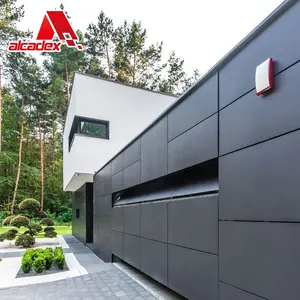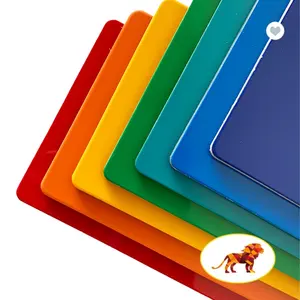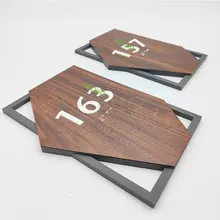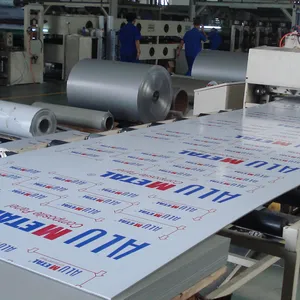What are Aluminum Composite Panels
Aluminum Composite Panels (ACPs) are a highly versatile and durable building material used across various sectors, including construction, advertising, and interior design. These panels consist of two thin aluminum sheets bonded to a non-aluminum core, typically made of polyethylene (PE) or mineral-filled fire-retardant material. The combination of metal and plastic offers a remarkable balance of light weight and rigidity, making ACPs an excellent choice for modern facade cladding, signage, and interior applications.
Designed for both functional and aesthetic purposes, Aluminum Composite Panels cater to architects, builders, and designers who seek to create sophisticated looks while demanding high-performance features. The layers of aluminum provide durability and weather resistance, making ACPs suitable for outdoor use. Simultaneously, the core material ensures flexibility and ease of installation.
The principle behind ACPs is simple yet effective: the outer metal layers protect against environmental elements and contribute to the panel's structural integrity, while the inner core absorbs sound and provides insulation. This layered composition allows for a vast array of surface treatments and colors, enabling customization to fit specific design requirements. From sleek metallic finishes for corporate buildings to vibrant colors for branding purposes, ACPs are adaptable to countless design visions.
Types of Aluminum Composite Panels
Aluminum Composite Panels come in various types designed to meet specific needs and applications. Here are some common varieties:
PVDF Coated Panels: These have a polyvinylidene fluoride coating which offers high resistance to weathering. They are commonly used for exterior wall cladding on commercial buildings.
PE Coated Panels: With a polyethylene coating, these panels are more suitable for interior applications or where high UV resistance is not as critical.
Fireproof Panels: Engineered with fire-resistant cores, these ACPs are used in buildings where fire safety is paramount.
Antibacterial Panels: These are specially treated to resist microbes and are ideal for hospitals or food service environments.
Anodized Aluminum Panels: Featuring an oxidized finish that provides an extra layer of protection against corrosion and wear.
Wood Finish Panels: These offer a natural wood appearance with the durability of aluminum and are often used in interior designs or architectural accents.
How to choose Aluminum Composite Panels
Selecting the right Aluminum Composite Panel involves considering several factors that influence performance, aesthetics, and suitability for the intended application:
Surface Treatment: Depending on whether the panel is for indoor or outdoor use, you may choose between PVDF coated for longevity in exterior applications or PE coated for interior use.
Functionality: Assess the functional needs such as fireproofing, soundproofing, or antibacterial properties. For instance, a hospital might prioritize antibacterial and fireproof panels.
Application Environment: Consider the environmental conditions the panels will be exposed to. For example, coastal buildings may require more corrosion-resistant materials.
Aesthetic Requirements: Decide on color schemes or finishes like wood or metallic textures that align with your project's design vision.
Project Solution Capability: Some suppliers offer additional services such as graphic design or 3D model design which can be beneficial in visualizing the final outcome.
Material Specifications: The choice between nonmetal cores like polyethylene and non-combustible mineral cores can impact safety standards compliance.
Best Aluminum Composite Panels on Alibaba.com
Alibaba.com is an expansive marketplace that connects businesses worldwide with suppliers offering a diverse range of Aluminum Composite Panels. Customers can find panels tailored to their project requirements, whether they need them for modern facade cladding systems or creating eye-catching signage. The platform's ability to facilitate business across borders makes it an excellent resource for sourcing both standard and specialized ACPs.
What sets Alibaba.com apart is its commitment to simplifying global trade. The platform provides tools that make it easy for businesses of all sizes to find products that match their custom requirements. With services like Trade Assurance, buyers have peace of mind knowing their payments are protected until their orders are successfully delivered.
Whether you're outfitting a boutique hotel with elegant interiors or constructing a resilient exterior for a high-rise building, Alibaba.com hosts suppliers who can provide high-quality Aluminum Composite Panels suitable for any commercial venture. The range of surface treatments from anodized to wood finishes coupled with extensive color options ensures your business's needs are not just met but exceeded without compromising on style or durability.
Common FAQs for Aluminum Composite Panels
What are the main advantages of using Aluminum Composite Panels?
Aluminum Composite Panels offer a blend of durability, light weight, and aesthetic versatility, making them suitable for a range of applications including exterior cladding, signage, and interior designs.
How do I determine the right type of Aluminum Composite Panel for my project?
Consider the application environment, required functionalities (such as fire resistance or sound insulation), aesthetic preferences, and any specific project solution capabilities offered by suppliers.
Can Aluminum Composite Panels be used for both interior and exterior applications?
Yes, Aluminum Composite Panels can be used for both interior and exterior applications, with certain types like PVDF coated panels being more suitable for exterior use due to their enhanced weather resistance.
What are the fire-resistant options available in Aluminum Composite Panels?
Aluminum Composite Panels with fire-resistant cores are available for projects requiring enhanced fire safety measures. These panels are designed to meet stringent fire codes and regulations.
Are there eco-friendly Aluminum Composite Panels available?
Yes, there are eco-friendly options that include panels made with recycled materials or those that offer features like energy efficiency through thermal insulation.
Can Aluminum Composite Panels be customized in terms of design and color?
Aluminum Composite Panels come in a wide range of colors and finishes, including wood textures and metallic coatings, allowing customization to fit specific design requirements.
What is the typical lifespan of Aluminum Composite Panels?
The lifespan of Aluminum Composite Panels varies based on environmental exposure and maintenance but generally, they can last for several decades due to their durable construction.
How do Aluminum Composite Panels contribute to thermal insulation?
The core material in Aluminum Composite Panels can provide a degree of thermal insulation, contributing to energy efficiency in buildings by reducing heating and cooling costs.
What maintenance is required for Aluminum Composite Panels?
Aluminum Composite Panels require minimal maintenance, usually just regular cleaning with water and mild detergents to maintain their appearance over time.
Are there any limitations to using Aluminum Composite Panels in construction?
While versatile, it's essential to choose the right type of panel for specific conditions; for example, selecting fire-resistant or marine-grade panels when required by safety standards or environmental conditions.
How are Aluminum Composite Panels installed?
Installation methods vary depending on the application but typically involve attaching the panels to a supporting structure using a combination of adhesives, rivets, or screws.
Can Aluminum Composite Panels contribute to soundproofing?
Yes, certain types of Aluminum Composite Panels have sound-absorbing properties that can contribute to reducing noise levels in commercial environments.











































 浙公网安备 33010002000092号
浙公网安备 33010002000092号 浙B2-20120091-4
浙B2-20120091-4